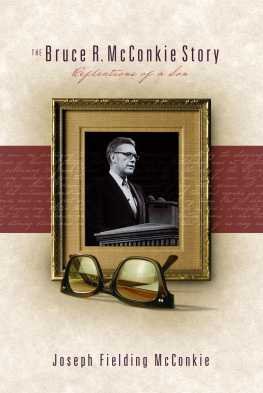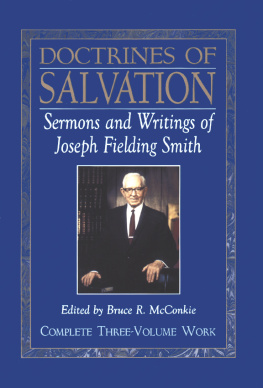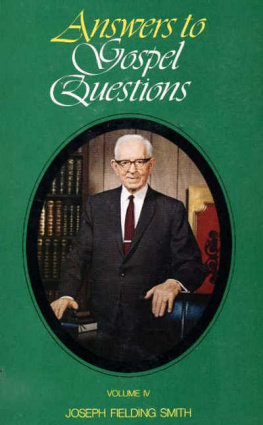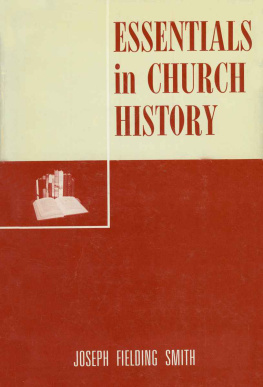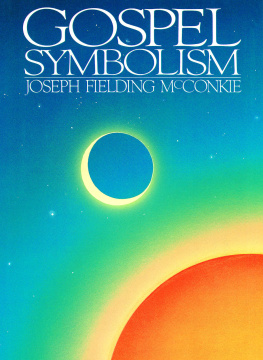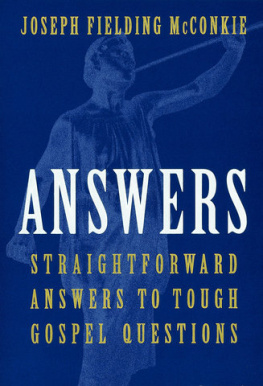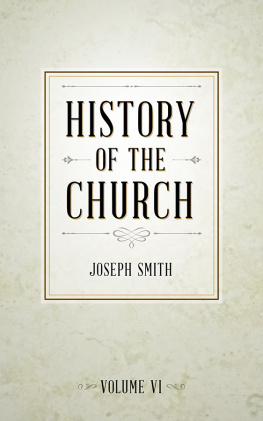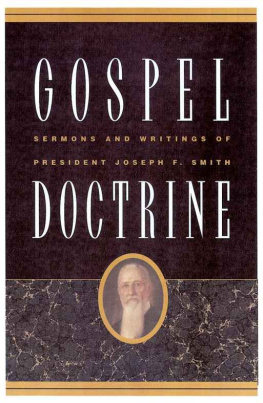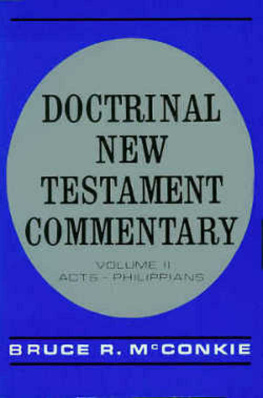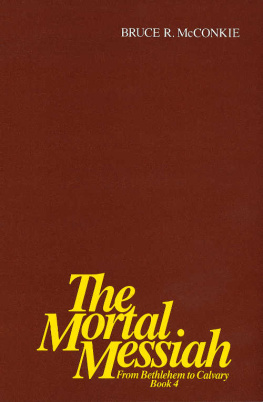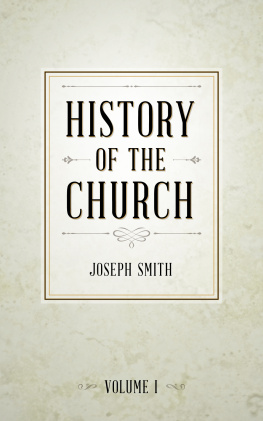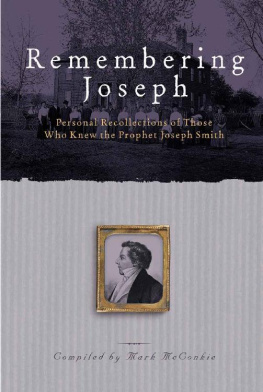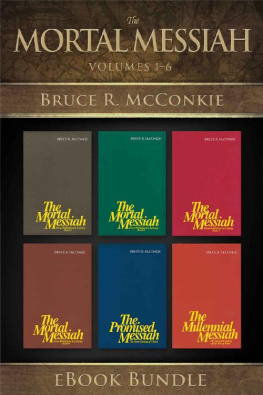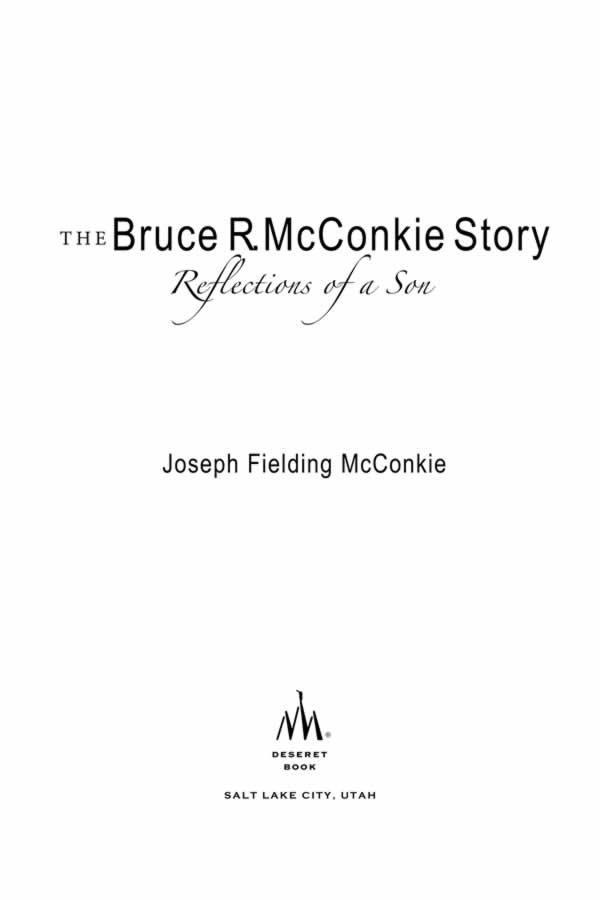2003 Joseph Fielding McConkie.
All rights reserved. No part of this book may be reproduced in any form or by any means without permission in writing from the publisher, Deseret Book Company, P.O. Box 30178, Salt Lake City Utah 30178. This work is not an official publication of The Church of Jesus Christ of Latter-day Saints. The views expressed herein are the responsibility of the author and do not necessarily represent the position of the Church or of Deseret Book. Deseret Book is a registered trademark of Deseret Book Company.
A life well lived contains lessons well worth remembering. Kindred spirits, though separated by time, are nonetheless still bound by purpose, for no great cause is accomplished in a generation. The hope, vision, and faith of our noble forebears must become ours.As we stand upon their shoulders, so in some future day others may be blessed to stand on ours.
Acknowledgments
Although I have sought and received much good counsel in the course of writing this work, I alone am responsible for it. Because for the most part it draws on personal recollections and family letters, to which most readers will not have access, these materials have generally not been formally referenced.
Thanks are extended particularly to my uncles Briton and Oscar McConkie and to my aunt Margaret Pope, the siblings closest in age to my father. Each was a delightful companion in reminiscence. Mother, of course, was a primary source, as were my brothers and sisters. Glen and Marva Rudd represented wonderfully the Lambourne neighborhood group that Mom and Dad enjoyed so much. Velma Harvey, Dad's trusted secretary for more than thirty years, shared helpful insights, as did Robert J. Matthews, who labored with Dad for over a decade on the Scriptures Publication Committee. Virtually everyone I have ever met who knew my father has a story to tell. People loved him and warmed to the subject.
As to the tedious matter of reading and rereading, which was attended by many helpful suggestions, special thanks are extended to my uncle Oscar and to my wife, Brenda. Thanks are also extended to Robert L. Millet, my colleague at Brigham Young University, and to Cory Maxwell and John Bytheway of Deseret Book. The painstaking labor of editing was ably done by Suzanne Brady. And this work would not be what it is were it not for my research assistant, Matthew B. Christensen.
Introduction
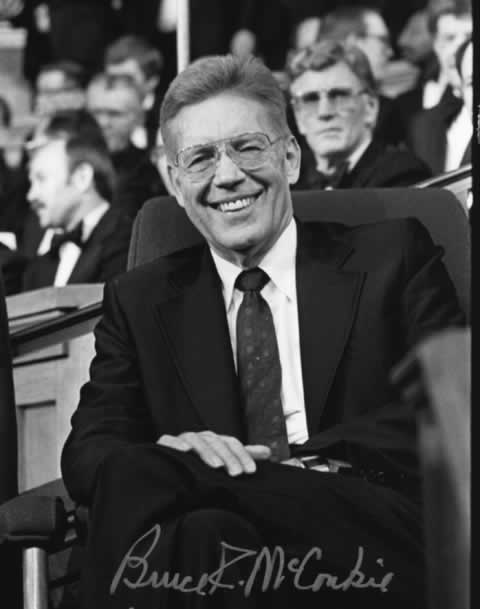
Among the many names that hold a place of honor as great theologians of this dispensation, Joseph Smith stands preeminent. He is the Prophet of the Restoration. He penned more scripture than any twelve Bible prophets combined. As a preacher his discourses are unequaled for clarity, power, and truth. He truly represented the voice of heaven, and his life matched his teachings.
In the providence of God, Joseph Smith was surrounded by men of remarkable ability to expound the truths he restored. They are men whose sermons we continue to read with profit and whose eloquence we can only hope to attain. The day simply will not come when we as a people cease to quote from the sermons of Brigham Young, John Taylor, and Wilford Woodruff. As long as there is so much as a flicker of light left in our souls, we will revel in the sermons and writings of Parley P. Pratt, Orson Pratt, and Heber C. Kimball. Who would not have been willing to endure the hardships of Zion's Campthe fifteen-hundred-mile march from Kirtland to Missouri under the most difficult of circumstancesto have walked beside such men and heard their conversations one with another? Each of these men has a written history, and each is a treasure of faith and courage.
In our own day, the Lord has not left us without men of like spirit and wisdom with whom we can rub shoulders. From them we can gain knowledge and understanding held by the noble and great of all gospel dispensations. Bruce Redd McConkie, the subject of this work, was such a man. Like those of his counterparts in earlier days, his, too, is a story of great faith.
To the rising generation he may be only a name they hear appended to a quotation in a talk or lesson. But to many of their parents, he is a man held in particular love and esteem. They remember the plainness with which he spoke and the power in the principles he expounded. Thousands of them remember the spirit that attended his final testimony of Christ given in the Tabernacle on Temple Square only two weeks before his death. If they met him, they probably have a story to tell of the occasion, just as did their parents or grandparents before them who noted in personal histories their associations with Joseph or Hyrum, with Brigham or Heber, with John Taylor or Wilford Woodruff or others because of their faith and the fire in their sermons.
Expounding Scripture
Like those so honored from generations past, Bruce R. McConkie was a disciple of Jesus Christ, and he echoed with eloquence the message of the Restoration taught by Joseph Smith, the great revelator of Christ for our dispensation. One cannot come to know Elder McConkie and his teachings without coming to know Christ. Bruce McConkie saw the revelations of the Restoration as the "key of knowledge" (Luke 11:52). With them he unlocked the past, and with them he unsealed the heavens. Their spirit became his spirit, and as one revelation unfolded another, he found himself writing volumes of scriptural commentary and doctrinal explanation. His first venture into print was the three-volume work entitled Doctrines of Salvation, in which he edited material from letters and other writings of Joseph Fielding Smith. When correspondence did not adequately cover a particular subject, he would elicit it from President Smith, put it into writing, and have him sign it. President Smith never found it necessary to change so much as a word of what Elder McConkie had written. Gospel insights from one of the great theologians of the Church were thus preserved.
These volumes were followed by the publication of Mormon Doctrine, an encyclopedic work covering hundreds of gospel topics from "Aaron" to "Zoramites" and whose publication constitutes a story in itself (see chapter 11). Perhaps no other book has had a greater influence on synthesizing and codifying Latter-day Saint doctrine. That influence is reflected in the Bible Dictionary, which is now a part of the Latter-day Saint edition of the King James Bible.
Then came Elder McConkie's three-volume Doctrinal New Testament Commentary, the only Bible commentary ever written by a general authority. Perhaps its most significant contribution was to introduce the Church to the Inspired Version (now called the Joseph Smith Translation) during a period in which it was viewed with considerable suspicion. Today the Joseph Smith Translation is recognized as a significant key that unlocks a great host of gospel truths to our understanding. The Doctrinal New Testament Commentary is a classic illustration of the light which the revelations of the Restoration shine on ancient scripture. It shows how all scripture under the tutelage of the Spirit becomes one and how, for instance, we cannot properly understand the writings of the apostle Paul without first having read what Alma and other Book of Mormon writers have to say about salvation by grace.
Elder McConkie's work on the New Testament was followed by a six-volume series on the Messiah. The first volume deals with the promise of a Messiah, as that promise is unfolded in scripture recorded before the birth of the Savior. The next four volumes detail the life and ministry of the Savior, particularly as the story is found in the Gospels. Again with the use of the Joseph Smith Translation and the revelations of the Restoration, Elder McConkie gave the Latter-day Saints a clearer view of the Messiah than they had previously enjoyed. His work weans us from secular scholarship and attunes our understanding with modern revelation. The concluding volume of this work,

